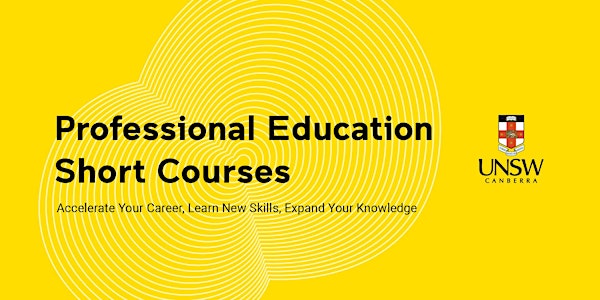
Ethics for Intelligence Professionals
A foundational short course focused on the understanding of the central ethical challenges faced by intelligence professionals.
Date and time
Location
UNSW Canberra City Campus
37 Constitution Avenue CIT J Block Reid, ACT 2600 AustraliaRefund Policy
About this event
- 8 hours
Area of Interest: Ethics, Risk, Risk Mitigation, Intelligence, Leadership
Course Summary
The moral philosopher Immanuel Kant described intelligence gathering (or, in his terminology, ‘spying’) as ‘that infernal art’. His distain reflects a widespread belief: that there is something fundamentally unethical – or at least unsavoury – about intelligence work.
This course takes the opposite view, starting with the idea that there is a fundamental ethical basis for the intelligence profession by articulating the ethical foundations of the intelligence profession. Learners are then equipped with the conceptual and analytic tools to enable them to make ethical choices in the context of intelligence work.
This course begins by articulating the ethical foundations of the intelligence profession. Drawing on a ‘toolbox’ of ethics concepts and approaches, and a range of case studies, we then explore how the ethical intelligence professional can approach some of the more ethically challenging aspects of their role. These include dealing with the right to privacy, the employment of deception, and the ethical constraints on recruitment of human sources.
Duration: 1 Day
Delivery Mode: On-campus.
Core topics
- Ethics Overview
- The Ethical Basis of the Intelligence Profession
- Privacy and Intelligence Gathering
- The Ethics of Deception and Manipulation
- Recruitment and Responsibility
Learning Outcomes
- Understand the central approaches to ethics
- Identify the central ethical challenges of intelligence work
- Define the ethical basis of the intelligence profession
- Analyse ethical challenges arising in intelligence work
- Devise well-justified yet practicable solutions to ethical dilemmas
Who should attend
This course is designed for those entering, working in, or operating in conjunction with, intelligence roles.
What will you receive
- UNSW Canberra certificate of completion/attendance
Instructors
Dr Deane-Peter Baker
Dr Deane-Peter Baker is an Associate Professor in the School of Humanities and Social Science at UNSW Canberra, the faculty of the University of New South Wales contracted to deliver the undergraduate educational program for the Australian Defence Force Academy (ADFA). At UNSW Canberra he is co-Convenor (with Professor David Kilcullen) of the UNSW Canberra Future Operations Research Group, and Director of MERLIN (the Military Ethics Research Lab and Innovation Network – launching 2023).
He is also a Senior Visiting Research Fellow in the Kings College London Centre for Military Ethics. Dr Baker’s work focuses mainly on the ethics of armed conflict, and he is a regular consultant to Australia’s Special Operations Command as well as serving as one of two Ethics Fellows to the Australian War College. Recent publications include Should We Ban Killer Robots? (Polity Press 2022), Morality and Ethics at War: Bridging the Gaps Between the Soldier and the State (Bloomsbury Academic 2020), and The Ethics of Special Ops: Raids, Recoveries, Reconnaissance and Rebels (co-author with Roger Herbert and David Whetham, Cambridge University Press forthcoming 2023).
Dr Ned Dobos
Dr Ned Dobos is Senior Lecturer in International and Political studies at UNSW Canberra. He is the author of two books--Ethics, Security, and the War Machine: the True Cost of the Military (Oxford University Press 2020), and Insurrection and Intervention (Cambridge University Press 2012)--and his research has appeared in journals such as Philosophical Studies, Ethics and International Affairs, Journal of Applied Philosophy, Journal of Moral Philosophy, and International Studies Quarterly.
Dobos has held visiting appointments at the Uehiro Centre for Practical Ethics at Oxford, the MacMillan Centre for International Studies at Yale, the McCoy Centre for Ethics at Stanford, and the philosophy department at Georgetown University. Currently he is Associate Director of the International Society for Military Ethics (Asia-Pacific chapter), a co-editor at the Australian Journal of Human Rights (Taylor and Francis), and associate editor of the Journal of Pacifism and Nonviolence (Brill).
Vedran ‘Maz’ Maslic
Vedran ‘Maz’ Maslic is a currently serving Major in the Australian Army Intelligence Corps. For much of his intelligence career, Vedran has focused on Source Operations where he deployed both as an advanced handler as well as an Officer in Charge of Human Intelligence teams. During an extended hiatus from the military, Vedran completed additional post-graduate studies and was an Adjunct Lecturer at the University of Gothenburg lecturing on interpersonal and intercultural communication.
Currently, Vedran is serving as the Chief Of Defence Force Research Fellow where he has commenced a PhD in military ethics. Additionally, he continues to instruct on the Source Operations, Interrogation and Psychological Operations as well as general intelligence courses at the Defence School of Intelligence with a particular focus on interpersonal and intercultural communication. Vedran is also the host of the increasingly popular podcast ‘The Voices Of War’.